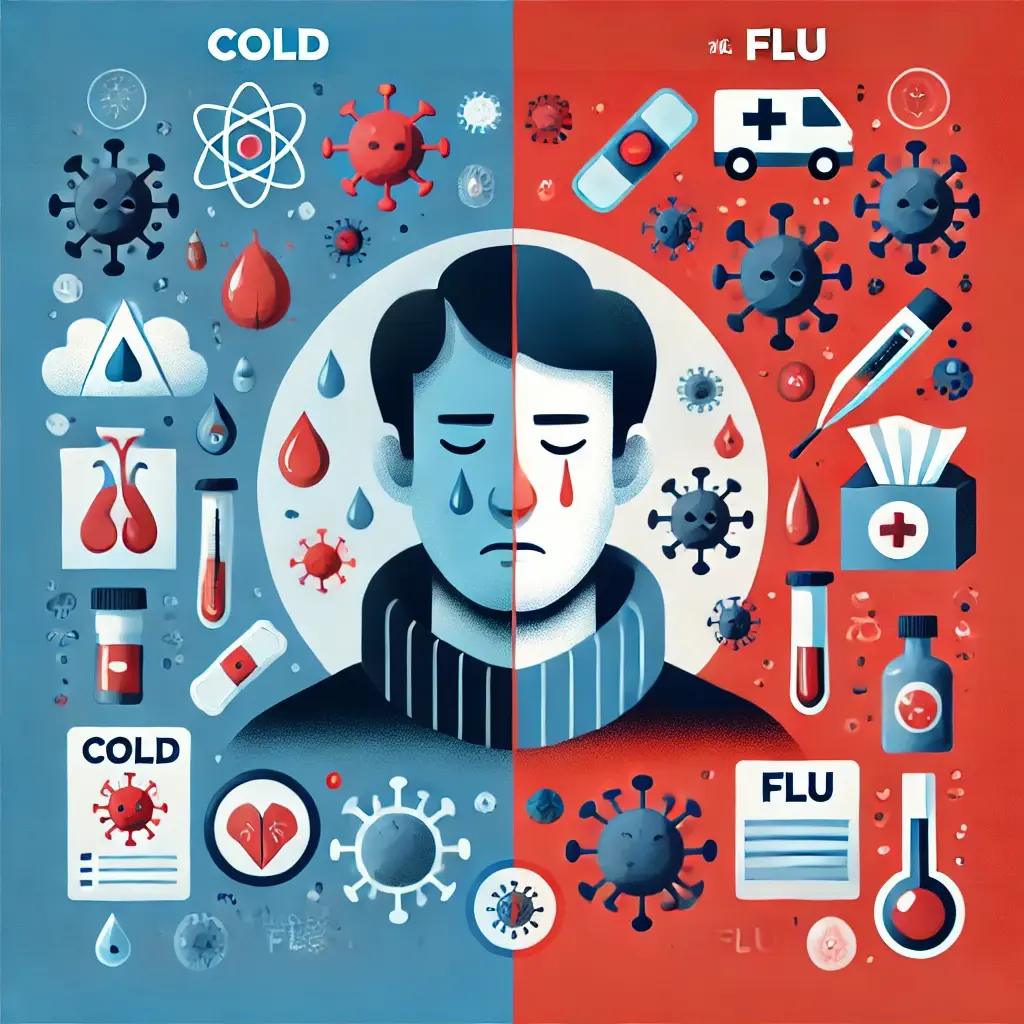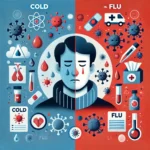What’s the Difference Between a Cold and the Flu?
Introduction
We’ve all been there feeling that dreaded tickle in your throat or the sudden wave of fatigue that makes you wonder, “Am I coming down with a cold or the flu?” Both the common cold and the flu are viral infections that affect our respiratory system, but they differ in how they hit and how long they last. In this post, we’ll clear up the confusion and help you better understand the key differences between a cold and the flu.
Symptoms: Cold vs. Flu
When you’re not feeling well, recognizing the difference between a cold and the flu is crucial to managing your symptoms and getting the right treatment.
Cold Symptoms:
- Runny or stuffy nose
- Sneezing
- Sore throat
- Mild cough
- Congestion
- Mild fatigue (but you can usually still go about your day)
A cold often starts gradually, and while the symptoms can be irritating, they tend to be milder and more manageable.
Flu Symptoms:
- Sudden fever (often over 100.4°F or 38°C)
- Chills and sweats
- Body aches and muscle pain
- Fatigue that knocks you off your feet
- Dry, persistent cough
- Sore throat
- Headaches
Flu symptoms tend to hit fast and hard. You may feel exhausted and unable to carry out daily tasks. The flu also comes with a higher chance of complications, especially in vulnerable groups like young children and older adults.
Comparison:
The major difference between a cold and the flu is the intensity. While both can make you feel unwell, the flu is generally more severe, with higher fevers, extreme fatigue, and body aches. If you find yourself down for the count and struggling to move, it’s more likely the flu than a cold.
Causes: What’s Behind the Cold and Flu?
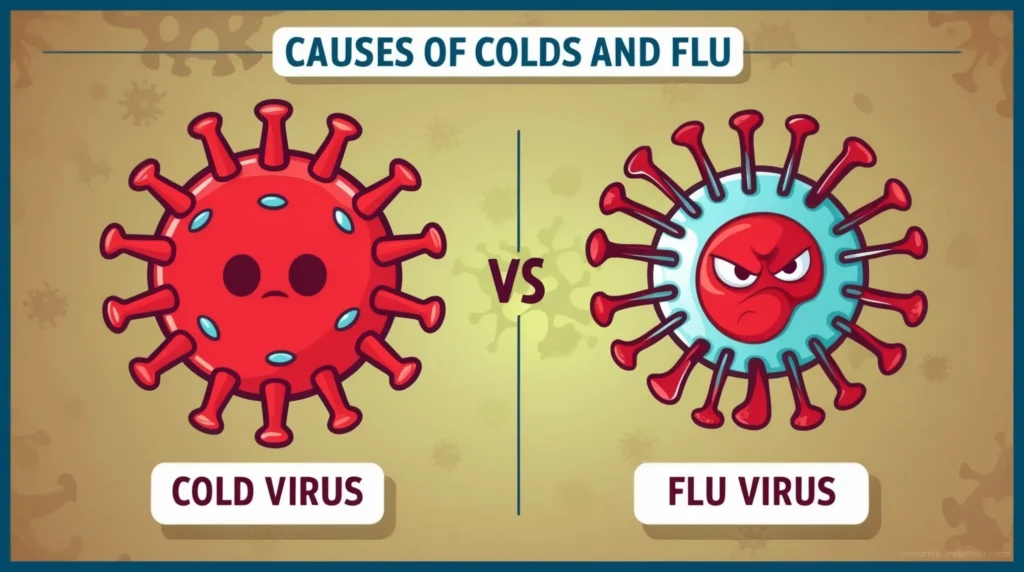
Both colds and the flu are caused by viruses, but the specific viruses that trigger each illness are different.
Cold Causes:
Colds are caused by a variety of viruses, but the most common culprit is the rhinovirus. There are more than 200 viruses that can cause a cold, which is why it’s so common and often returns multiple times in a year.
Flu Causes:
The flu, on the other hand, is caused by the influenza virus, which is typically more aggressive than the viruses responsible for colds. The flu virus comes in different strains (such as Influenza A, B, C, and D), and certain strains can lead to more severe symptoms and even complications like pneumonia.
Comparison:
The key difference here is the type of virus. Colds are caused by a broad variety of viruses, while the flu is specifically linked to the influenza virus, which tends to cause more serious and widespread infections.
Treatment: How to Manage a Cold vs. the Flu
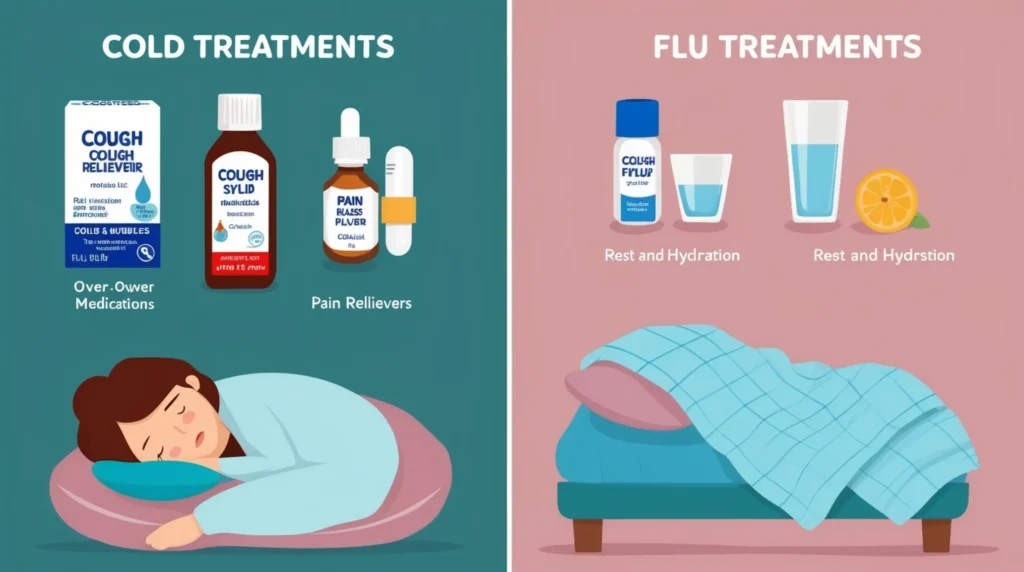
When you’re down with a cold or flu, the treatment focuses on relieving symptoms since there’s no quick cure for either. learn more at Healthbuzzs.com
Over-the-counter Remedies:
For both colds and the flu, over-the-counter (OTC) medications can help manage symptoms like congestion, sore throat, and cough. For colds, you might use:
- Decongestants to relieve stuffy nose
- Cough suppressants or lozenges
- Pain relievers like ibuprofen or acetaminophen
With the flu, the same OTC meds can help, but you might also want to take fever reducers since flu often brings a high temperature.
Rest and Hydration:
Whether it’s a cold or the flu, your body needs plenty of rest to recover. Staying hydrated is crucial too, as fluids help thin mucus and prevent dehydration, especially if you’re running a fever with the flu.
When to See a Doctor:
- Cold: If a cold lasts more than 10 days or symptoms suddenly worsen, it could be something more serious like a sinus infection, and you should seek medical advice.
- Flu: See a doctor if you have severe symptoms such as difficulty breathing, chest pain, persistent high fever, or if you’re in a high-risk group (young children, elderly, pregnant women, or those with chronic illnesses). Antiviral medications may be prescribed for the flu to reduce the severity and duration if caught early.
Prevention: Stay Ahead of the Cold and Flu
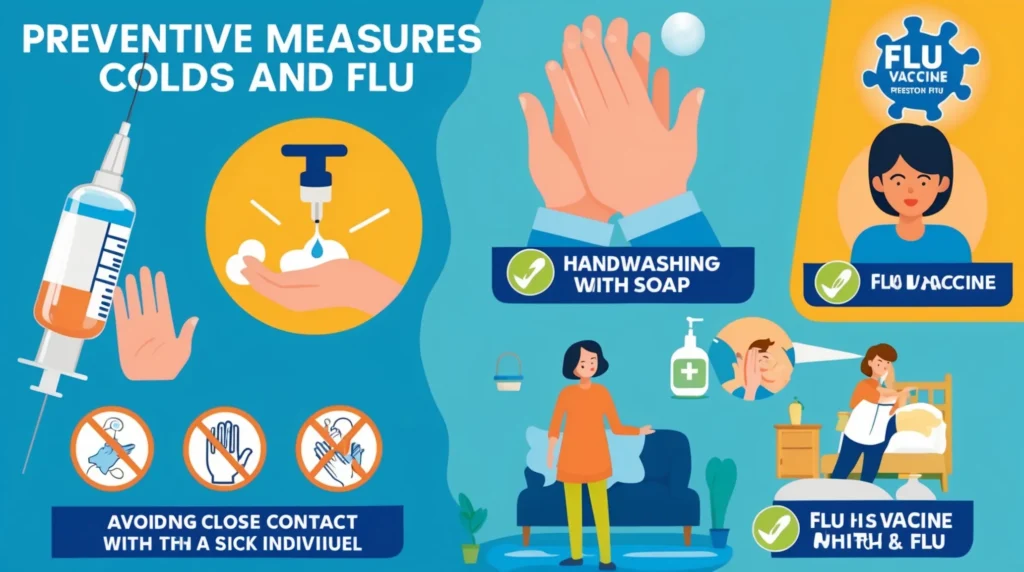
Preventing colds and the flu requires similar strategies, but there’s one major difference: vaccines.
Vaccination:
- Cold: Unfortunately, there’s no vaccine for the common cold since it’s caused by so many different viruses.
- Flu: The flu vaccine is the best defense against the influenza virus. It’s recommended to get vaccinated annually, as flu strains change year to year.
Other Preventive Measures:
- Hand Hygiene: Wash your hands frequently with soap and water, especially after being in public places.
- Avoid Close Contact: Stay away from people who are sick and, if you’re sick, avoid spreading germs by covering your mouth and nose when you cough or sneeze.
- Boost Your Immune System: Maintaining a healthy diet, staying active, and getting enough sleep can all help support your immune system to fight off infections.
Conclusion: Cold or Flu Knowing the Difference Matters
Understanding whether you have a cold or the flu can make a big difference in how you manage your symptoms and recover. While both illnesses share some similarities, flu symptoms are usually more intense and can lead to complications. Paying attention to how fast your symptoms develop and their severity can help you figure out what you’re dealing with and when it’s time to see a doctor. Heart attack cause and treatments.
Hi there! I’m content writer and blogger. With over two years of experience, I’ve shared my passion for writing across various platforms. I firmly believe in the transformative power of words and look forward to sharing this journey with you. Enjoy my work!
